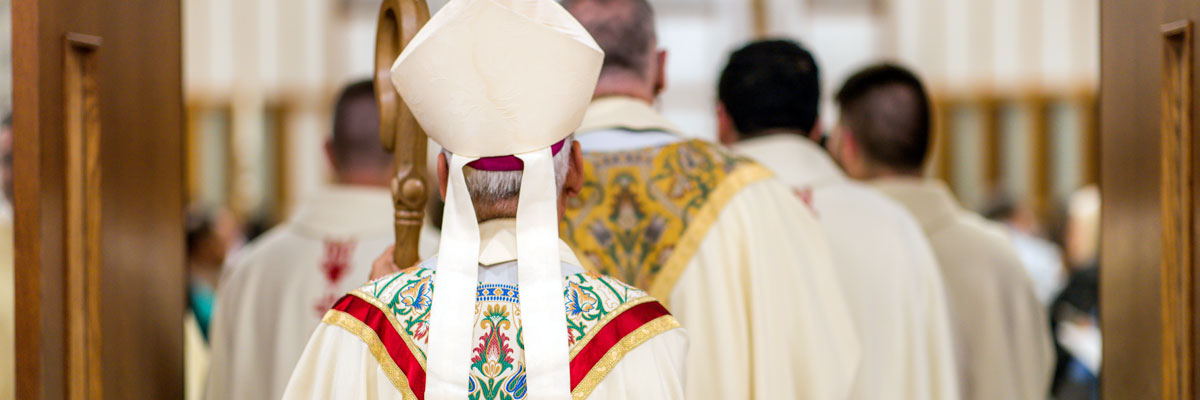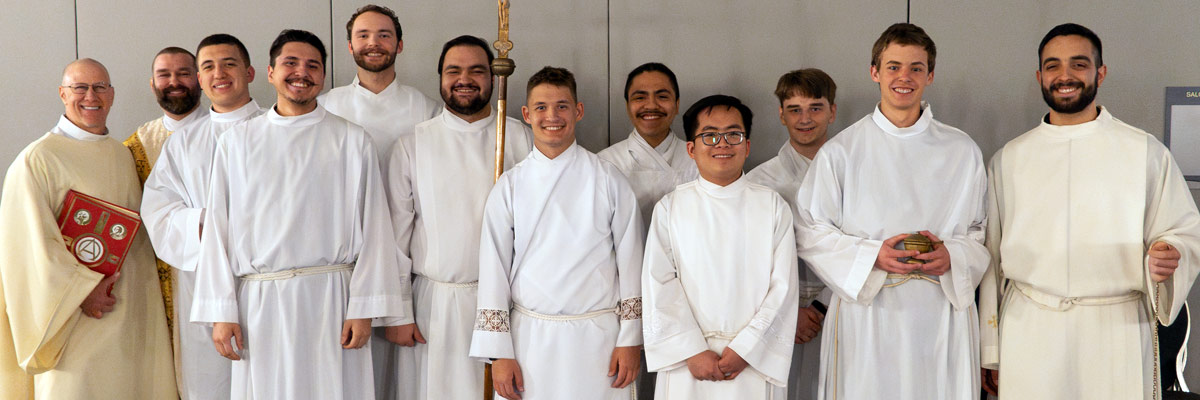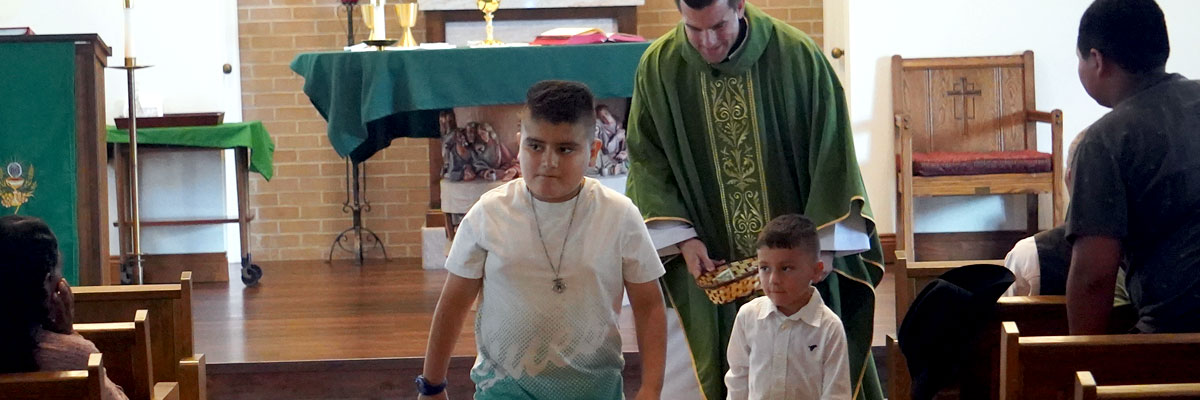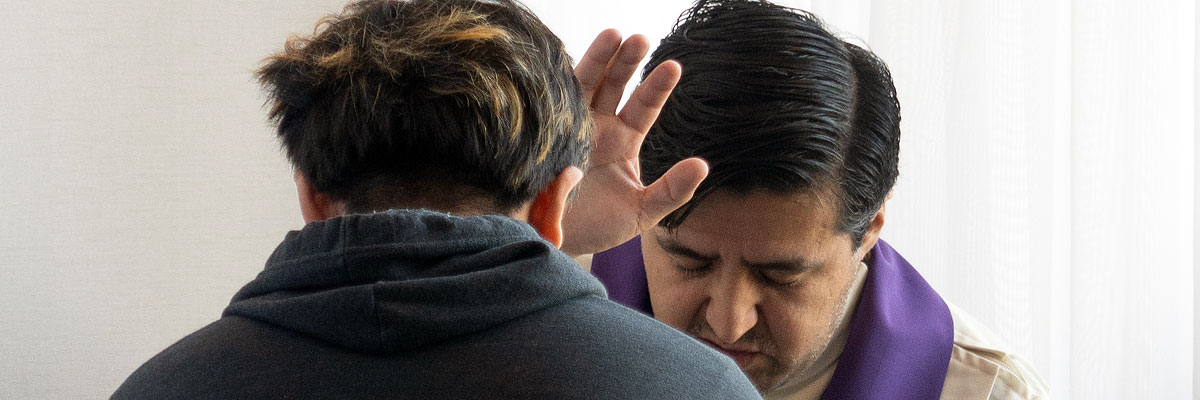Official Website of the
Catholic Diocese of Little Rock
Priesthood Ordination of Deacons Alex Smith, Emmanuel Torres, Omar Galván, Brian Cundall and Ben Riley
Published: May 29, 2021
Bishop Anthony B. Taylor preached the following homily at Barton Coliseum in Little Rock on Saturday, May 29, 2021. It is based on the following readings: Jeremiah 1:4-9; Ephesians 4:1-7,11-13; and John 15:9-17.

Bishop Taylor
Alex, Emmanuel, Omar, Brian and Ben, as we gather today in the presence of fellow believers from throughout Arkansas whom God has called you to serve as a priest, we recall Jesus' Last Supper 2,000 years ago — the events of which constitute, in effect, his last will and testament.
The treasure he bequeaths us in his will is the Eucharist and the priesthood, both of which he institutes at the Last Supper. And the testament he left us that evening is found in his farewell discourse in the Gospel of John.
These days most people put together a will with the help of a lawyer, but very few people write a testament, despite our phrase "last will and testament." A testament is a document in which we articulate the wisdom and values that we want to share with those we leave behind, the spiritual patrimony we want our loved ones to inherit. A will, on the other hand, conveys the material patrimony we leave them.
Once a priest, always a priest. This is not a 9-to-5 job. You are to love everyone as Jesus has loved you, 24 hours of the day, even when people call you at 3 in the morning. Indeed, especially when people call you at 3 in the morning. From this day forward, you are to lay down your life for others as Jesus did for you, 24 hours a day.
The Gospel passage that you chose for your ordination is taken from the most important section of Jesus' farewell discourse. In these verses, he articulates the higher standard to which he holds us whom he feeds with his body and blood, and above all those of us whom he calls to be priests: the standard of self-sacrificing love.
Let me unpack this just a little bit. When I ask what is God's greatest commandment, most people give me the wrong answer, adding that there are two greatest commandments. "Love the Lord your God with all your heart, mind and soul" and "love your neighbor as yourself." Isn't that what Jesus said? What could possibly be greater than that? Especially since part of our spiritual patrimony is Jesus' parable of the Good Samaritan in which he teaches us that every single human being is our neighbor, even the most disgusting person imaginable. To love the man lying in the ditch as much as we love ourselves.
But hopefully you learned in theology that these are not God's greatest commandments. Jesus says they are the greatest commandments "in the law" meaning merely that they are the greatest commandments in the Old Testament, the greatest commandments in the law. The New Testament, which builds on the law and fulfills it, wasn't written yet.
At the Last Supper, during his farewell discourse, Jesus gave us a new, far greater commandment that supersedes those greatest commandments of the Old Testament, saying: "This is my commandment, that you love one another as I have loved you. Greater love has no one than this, than to lay down one's life for his friends." The greatest commandment is to love as Jesus loves.
And how does he love us? To the death. To love others not merely as much as ourselves, but rather to love them more than we love ourselves. We are to love as Jesus loves: completely, selflessly, to the death. And this applies even more to us who are conformed most intimately to Christ through ordination.
Ben, Brian, Omar, Emmanuel and Alex, every priest is an “alter Christus,” another Christ. Offering the Eucharist is our greatest privilege, but there is a sobering — and also beautiful — truth I need to point out: Jesus was simultaneously the priest and the sacrifice he offered as a priest, and the same must be true for you.
In every Mass you celebrate "in persona Christi," in the person of Christ, so you too must be simultaneously the priest and the sacrifice you offer in communion with the self-sacrifice of Jesus, whom you then offer sacramentally to the Father as an oblation for our redemption and in expiation of our sins. This offering of yourself to the Father in union with Jesus obligates you to then live out your gift of self in everything you do throughout the day.
The phrase "once a priest, always a priest" means two things: it doesn't only mean that you will soon be a priest for the rest of your life. It also means that you are always a priest, another Christ, all 24 hours of the day. Once a priest, always a priest. This is not a 9-to-5 job. You are to love everyone as Jesus has loved you, 24 hours of the day, even when people call you at 3 in the morning. Indeed, especially when people call you at 3 in the morning. From this day forward, you are to lay down your life for others as Jesus did for you, 24 hours a day.
My brothers, people think you chose to become a priest, which is not true. Jesus chose you to be a priest — that's why we call it a vocation and not merely a career — what you did was respond to his call, for which I am very grateful, even though I know from my own experience that even our ability to respond to his call is due ultimately to his grace as well. But you did respond to that call, which requires courage, and you did so with the same self-sacrificing generosity that must always mark your priestly ministry from this day forward.
In today's Gospel Jesus says to you the same thing he said to those first apostles at the Last Supper, during which he instituted the sacraments of the Eucharist and the priesthood: "You did not choose me, but I chose you and appointed you that you should go and bear fruit, and that your fruit should remain, that whatever you ask the Father in my name he may give you. These things I command you, that you love one another." God bless you all. And may God bless us abundantly through you for many years to come.








